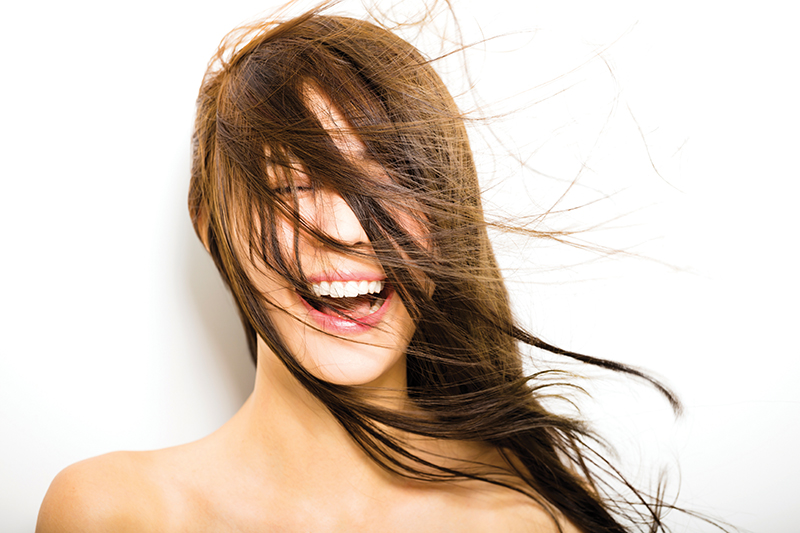Whether it’s lush or lacklustre, thinning or fine, the state of our hair can dramatically affect how we feel about ourselves. We speak to medical practitioner Dr Eric Lam (Diploma in Clinical Dermatology, University of London) to find out how to keep our tresses in tip-top condition.
What are some common hair complaints you get in Hong Kong?
Hereditary hair loss for both men and women is the most commonly encountered hair loss problem here. It can affect anyone, from the age of 20 up to your 40s and 50s. It can be very difficult to detect as it progresses slowly over the years. Patients usually come to seek medical advice when hair loss has progressed to such an extent that it has affected their daily hair styling. Acute Telogen Effluvium – also known as stress-induced hair shedding – is also very common. It is caused by psychological stress such as depression, anxiety or pressure; physical stress such as major surgery, chronic illness or accidents; and medical factors such as endocrine diseases, medication or chemotherapy. Alopecia Areata is common in children and teens and is usually discovered by a hair stylist or family members. It’s a bald patch, or several bald patches on the scalp and is believed to be caused by the body’s own white cells. It usually clears up spontaneously within a year.
What causes hair thinning and dandruff?
Hair thinning and dandruff are problems relating to hair and scalp skin respectively. In the medical profession we have to evaluate these issues separately, although they can occur at the same time. Hair thinning result from any one of the causes listed above, so it’s very important for people to undergo a medical evaluation to uncover the underlying causes of the problem. Dandruff most commonly results from skin scaling as a result of changes in humidity, just as your skin goes scaly in the winter. It can also be a result of scalp dermatitis (eczema), scalp psoriasis, scalp seborrheic dermatitis or scalp tinea infection, which is a fungal infection.
What are some common causes of thinning hair in women, and what can we do about it?
For women, sudden hair loss can be caused by iron deficiency anemia (often caused by heavy periods), thyroid dysfunction or autoimmune disease. It also occurs just after giving birth, after menopause and can be caused by certain medications. For women, it’s important to distinguish between acute and chronic hair shedding. If a woman comes in with an alarming rate of hair shedding that has taken place over a period of six weeks or so, it’s important to detect underlying causes; however if the thinning has taken place over years it’s less likely to be caused by underlying factors.
How is female hair thinning different to male hair thinning?
The pattern of hair loss is quite different for men and women. It’s highly unlikely for a woman to go completely bald, for instance. For men, hair loss and thinning usually starts from the frontal hairline and crown, before expanding to involve the mid-scalp, eventually leaving a rim of hair just above the ears and behind the head. For women, they normally notice that their hair parting site has become wider and wider.
What can we do to treat or avoid thinning hair?
If you have a family history of hair loss, it’s important to monitor your hair, and take preventative steps. Hair loss also serves as an alarm that you may be suffering from another medical condition; make sure to get checked out by your doctor, especially if you notice yourself losing an unusual amount of hair. Choose your hair care products as carefully as you would your skincare products, and take care of your health in general.
Will daily hair washing make our hair go thin?
On the contrary, we need to wash our hair daily to maintain good hair hygiene, especially in the summer. Sweat and styling products can irritate the scalp, leading to itchiness and even scalp dermatitis.
A lot of people are switching to hair care products that are organic or free from SLS, parabens and other chemicals. Can organic products clean our hair effectively?
As a matter of fact, organic products have a similar effectiveness to conventional shampoos and conditioners. However, alcohol and preservatives in all hair products can lead to breakage and less attractive-looking hair.
What is the worst thing that you can do to your hair?
If you are concerned about hair loss, you should consider seeking early medical attention. Also, before trying out hair care products for hair loss, speak to your doctor to ensure you receive the correct and timely treatment, it is not possible for hair follicles to recover once they are lost. Seek your medical advice about commencing treatment once you notice your hair starting to thin.
Strands of Truth?
Dr. Lam gives his final word on common hair myths:
- Wearing a hat or helmet will NOT result in excessive hair loss
- Over-washing hair will NOT lead to hair loss
- Changing shampoo from time-to-time CANNOT prevent or reduce hair loss
- Shaving your head does not make your hair grow back thicker.
- Whether or not you have white hair has no bearing on whether you’ll suffer hair loss later down the line.


